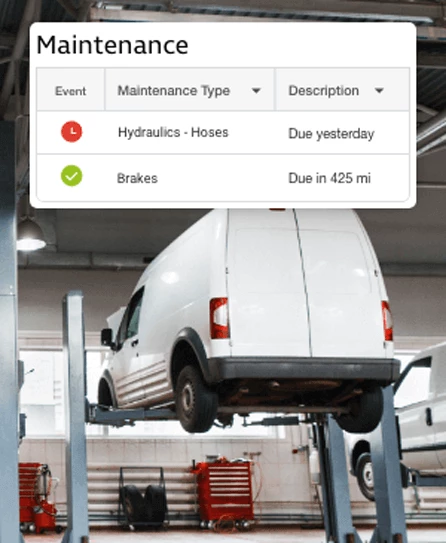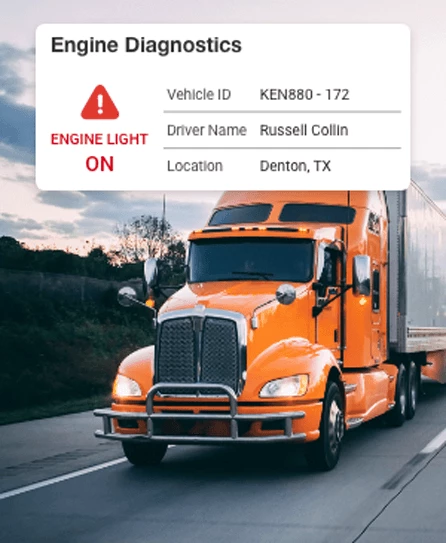Key Takeaways
Lack of proper maintenance and poor driving behaviours are two of the top causes of reduced vehicle life within fleets. In your business, vehicles are some of your most valuable assets, and ensuring that they are well maintained and driven safely can have a significant impact on cost of ownership and extend replacement cycles. A GPS fleet tracking system can help extend the life of your vehicles by:
- Improving driver safety through measurement and coaching
- Digitising maintenance planning
- Reducing mileage through better job management and route optimisation
- And by limiting engine idling
5 ways GPS fleet tracking can extend vehicle lifecycle
GPS fleet tracking helps organisations in many ways, but one often overlooked benefit is its ability to help extend vehicle life and reduce the cost of ownership. Through the digitisation of maintenance schedules, real-time capture of engine faults and monitoring driving behaviour, fleet tracking systems provide the tools to extend vehicle life and replacement cycles. Here are the top 5 ways a GPS fleet tracking system can extend vehicle lifecycles:
1. Driver behaviour
A primary cause of collisions is often attributed to poor driver behaviour. Installing a system that identifies bad driving behaviours and provides real-time alerts and coaching can help to reduce accident rates and extend the life of your vehicle.
GPS fleet tracking system provides audible and visual alerts for poor driving behaviours, including:
- Harsh braking
- Harsh acceleration
- Harsh cornering
- Speeding
By identifying drivers with the best track records via scorecard solutions, companies can install rewards and recognition programmes that promote positive driving behaviour. When paired with artificial intelligence (AI), fleet tracking systems can spot poor driving behaviours that contribute to excessive wear and tear and take action early, helping to reduce unscheduled maintenance cost.

2. Maintenance planning
Performing regular maintenance is the number one way to extend the life of your vehicles. A GPS fleet tracking system enables you to create digital maintenance schedules that are based on vehicle odometer readings, so no matter where your vehicles are located you always know what maintenance is required. By keeping on top of regular maintenance you are helping to prevent serious issues and extend the life of your vehicles.

3. Pre-trip inspection
Fleet inspections are the first line of defense against large and costly maintenance issues that can significantly reduce the life of your vehicles. Like preventative maintenance, pre-trip inspections help reduce costs, increase safety, and keep vehicles on the road longer. GPS fleet tracking systems digitise the entire process with easy to use mobile applications that capture inspection data and make it instantly available to fleet and maintenance managers. This process ensures that inspections are completed, and issues are reported and acted on quickly.

4. Engine diagnostics
Today’s engines can speak directly to us, providing early warnings on potentially serious issues. Fleet tracking systems offer instant alerts for engine warings.
GPS fleet tracking devices connect directly to a vehicle’s OBD-II port, relaying engine diagnostics directly to fleet and maintenance managers in real-time. Knowing that a warning is being displayed in a vehicle means you can act on this quickly, and ensure that the vehicle isn’t being driven for long periods of time with an error that could be causing long-term damage.

5. Reduce Mileage
Route optimisation and job planning tools provided by GPS fleet tracking software reduce the number of miles driven, extending a vehicle's life. With better route planning and more efficient job planning, fleets can extend the life of their vehicle by driving fewer miles, reducing excessive idling, and limiting overall wear and tear.
Lower mileage not only extends the life of the vehicle but also increases the resale value, helping to reduce total cost of ownership.

Thanks to technology, the average lifespan of a vehicle today is significantly longer than it was a few decades ago. A GPS fleet tracking system can help extend the lifespan of your vehicles by improving driver behaviour, helping ensure scheduled maintenance is completed, and alerting the proper people to potential issues, including irregular wear and tear and engine trouble.
